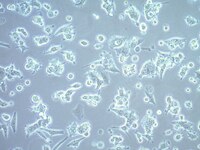SCC276 Sigma-AldrichMCF-7 BUS Human Invasive Ductal Carcinoma Cell Line
Recommended Products
Overview
| Replacement Information |
|---|
| References |
|---|
| Product Information | |
|---|---|
| Quality Level | MQ100 |
| Biological Information | |
|---|---|
| Cell Line Type |
|
| Physicochemical Information |
|---|
| Dimensions |
|---|
| Materials Information |
|---|
| Toxicological Information |
|---|
| Safety Information according to GHS |
|---|
| Safety Information |
|---|
| Packaging Information | |
|---|---|
| Material Size | ≥1X10⁶ cells/vial |
| Transport Information |
|---|
| Supplemental Information |
|---|
| Specifications |
|---|
| Global Trade Item Number | |
|---|---|
| Catalogue Number | GTIN |
| SCC276 | 04065267034607 |
Documentation
MCF-7 BUS Human Invasive Ductal Carcinoma Cell Line SDS
| Title |
|---|
Data Sheet
| Title |
|---|
| Data Sheet-SCC276 |










